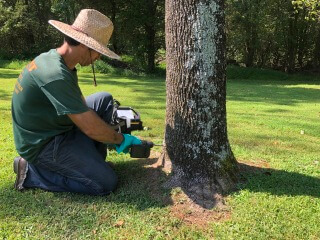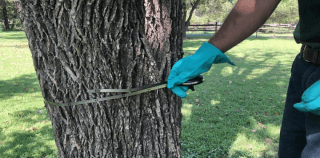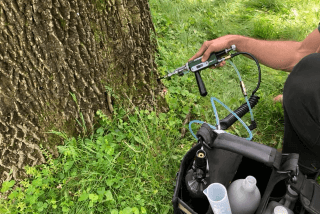Plant healthcare refers to a comprehensive approach to maintaining the health and vitality of trees and plants. It includes regular monitoring, preventive treatments, disease and pest management, fertilization, and other specialized services. Plant healthcare is essential for promoting plant growth, preventing issues, and extending the lifespan of trees and plants.
Signs that indicate the need for plant healthcare services include stunted growth, leaf discoloration, wilting, thinning canopies, pest infestations, fungal infections, and general signs of decline. An arborist or plant healthcare professional can assess the condition of your trees and plants and recommend appropriate treatments.
Plant healthcare services provide numerous benefits, including improved plant vigor, enhanced resistance to diseases and pests, early detection and treatment of potential issues, proper nutrient balance, improved flowering and fruiting, and overall long-term health and beauty of trees and plants.
Plant healthcare treatments can vary based on the specific needs of your trees and plants. They may include regular fertilization, soil amendments, pruning to remove diseased or damaged branches, pest and disease management through targeted treatments, and implementing preventive measures to protect against potential issues.
Yes, plant healthcare treatments are designed to be safe for the environment, including people, pets, and beneficial organisms. Qualified professionals follow industry best practices and use environmentally friendly products and techniques to ensure the health of your plants while minimizing any potential risks.
The frequency of plant healthcare services depends on various factors, such as the tree or plant species, its age, environmental conditions, and the specific needs of your landscape. A professional arborist or plant healthcare provider can create a customized plan that outlines the appropriate timing and frequency of treatments for your specific situation.
Yes, in many cases, plant healthcare services can help revive struggling or diseased trees. By identifying the underlying causes of decline or disease and implementing appropriate treatments, such as nutrient supplementation or targeted pest management, professionals can often restore the health and vitality of trees.
While there are certain plant healthcare tasks that homeowners can undertake, such as basic pruning or watering, it is generally recommended to hire a professional arborist or plant healthcare provider. They have the expertise, knowledge, and specialized equipment to accurately diagnose issues, develop customized treatment plans, and safely administer treatments for optimal results.


